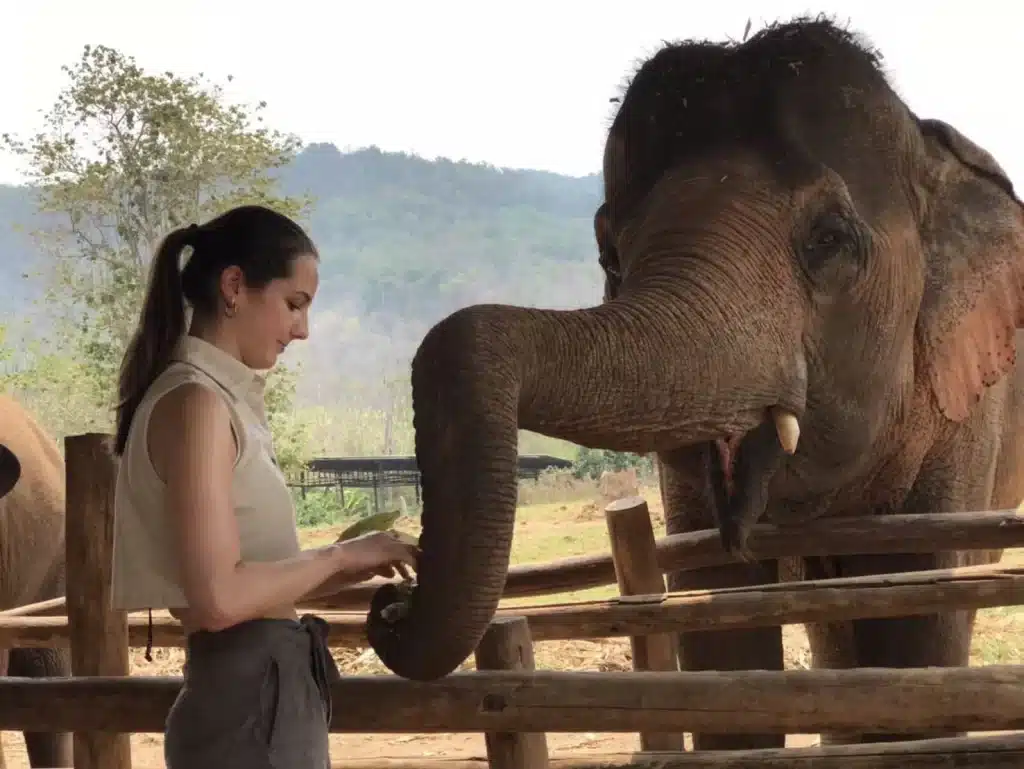Elephant Feeding: What Elephants Eat for Protein at Our Chiang Mai Elephant Sanctuary
Elephants, known as the gentle giants of the animal kingdom, are majestic creatures that require a special diet to thrive. At our Chiang Mai sanctuary, we prioritize their well-being and nutrition. One crucial aspect of their diet is protein, essential for their growth, maintenance, and overall health. This post will explore what elephants eat for protein and how we ensure they receive nutrients during their elephant feeding.
The Importance of Protein in an Elephant’s Diet
Protein is a vital component of an elephant’s diet, crucial for various physiological functions. Elephants need protein for muscle development, maintaining healthy skin and hair, and supporting their immune systems. In the wild, elephants obtain protein from various sources, including plants, leaves, fruits, and insects.
Protein Sources for Elephants at Our Chiang Mai Sanctuary
At our sanctuary in Chiang Mai, we meticulously curate a diet that precisely meets the protein needs of our elephants. We provide them with diverse plant-based protein sources during their elephant feeding, ensuring they receive a well-rounded nutritional intake they can trust.
Supplementary Protein Sources: Ensuring a Balanced Diet
In addition to natural protein sources like bananas, grasses, and legumes, we provide our elephants with supplementary protein sources to ensure they receive a well-rounded and balanced diet. This may include specially formulated pellets or biscuits enriched with additional protein and nutrients to meet the specific needs of each elephant. These supplements help us address deficiencies in their diet and ensure they get all the essential nutrients required to thrive.
Bananas: A Favorite Protein-Rich Treat During Elephant Feeding
One of the most beloved treats for our elephants is bananas. These sweet and nutritious fruits are rich in essential amino acids, a great energy source, and a surprising amount of protein. Feeding our elephants bananas is a natural and healthy way to meet their protein requirements, reassuring you about their welfare. Hand-feeding an elephant banana is an amazing experience. You will make a friend for life.
Grasses and Hay
Grasses and hay are staple components of an elephant’s diet. These fibrous plants provide bulk for digestion and contain valuable proteins. We source high-quality grass and hay to ensure our elephants receive the necessary protein for their well-being.
Legumes and Pulses
Legumes and pulses are excellent sources of plant-based protein for elephants. To boost protein intake, we incorporate lentils, chickpeas, and beans into their diet. These legumes also provide essential vitamins and minerals, making them valuable to their meals.
Nuts and Seeds
Nuts and seeds are nutrient-dense foods that offer elephants a lot of protein. We include a variety of nuts and seeds, such as almonds, pumpkin seeds, and sunflower seeds, in their diet to enhance their protein consumption. These foods also provide healthy fats and fiber, promoting overall health.
Supplements
In addition to natural protein sources, we provide our elephants with protein supplements to ensure they meet their daily requirements. These supplements are specially formulated to cater to elephants’ nutritional needs and are carefully administered by our team of experts.
Ensuring a Balanced Diet for Our Elephants
While protein is essential for an elephant’s diet, it is crucial to maintain a balance with other nutrients as well. At our Chiang Mai sanctuary, we work with nutritionists and veterinarians to create customized meal plans for each elephant, considering their age, health status, and individual preferences.
The Elephants of Chiang Mai
Chiang Mai is home to several elephant sanctuaries, which provide a safe and ethical environment for these animals. Unlike traditional elephant camps, which offer rides and performances, the sanctuaries focus on the well-being of the elephants and aim to educate visitors about conservation and protection efforts.

Feeding Time
Elephant feeding is a highlight of the sanctuary experience. Visitors are usually allowed to feed the elephants various fruits and vegetables they eagerly consume. Watching these gentle giants use their trunks to pick up each piece of food with precision and grace is a magical moment.
Interactive Learning
As you feed the elephants, the mahouts (elephant caretakers) often provide information about their diet, behavior, and individual personalities. You may learn that elephants have a varied diet that includes grass, bamboo, fruits, and more, and can consume hundreds of pounds of food in a day.
Conservation Efforts
By participating in feeding activities, visitors not only get to connect with the elephants on a personal level but also contribute to their care and conservation. Many sanctuaries use the proceeds from visitor programs to support rescue and rehabilitation efforts for mistreated or orphaned elephants.
A Respectful Encounter
It’s important to note that while feeding the elephants is a fun and rewarding experience, it’s essential to do so respectfully and responsibly. Always follow the sanctuary’s guidelines and listen to the mahouts’ instructions to ensure the elephants’ well-being.
In Conclusion
Proper nutrition and adequate protein are essential for elephant health and vitality. At our Chiang Mai elephant sanctuary, we are committed to providing our gentle giants with the nutrition they need to thrive. By offering a variety of protein sources, including grasses, legumes, nuts, seeds, and supplements, we ensure that our elephants receive a balanced and nutritious diet.




